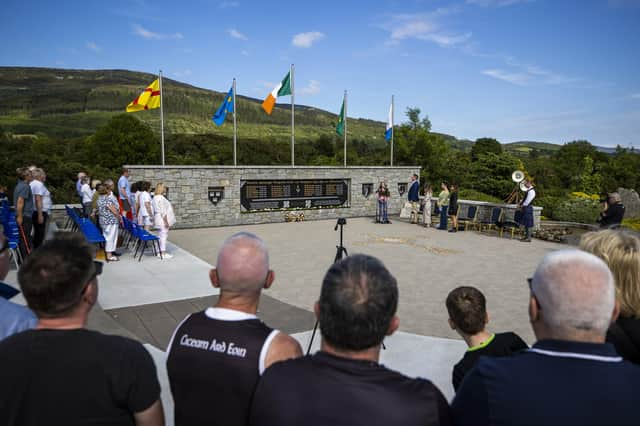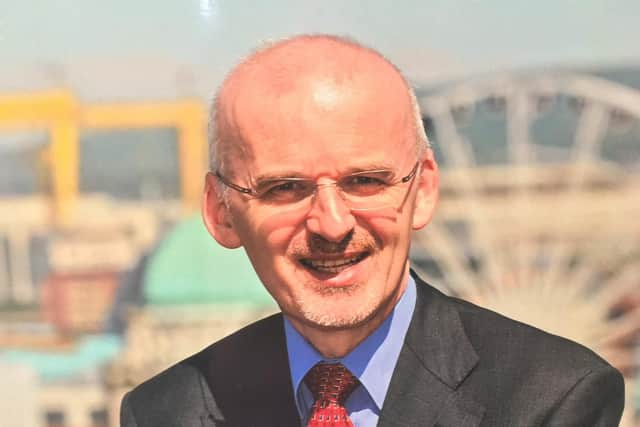Philip McGarry: True peace and reconciliation will only come to our bitterly divided society by facing our past head on


Nobody has been convicted of a Troubles-related killing for nearly a decade, and as perpetrators and witnesses grow older, it is increasingly unlikely that anyone will ever be again. Victims hoping for justice through the legal system are almost certain to be disappointed.
Those (including the government) placing their hopes on some form of ‘truth recovery’ will be equally disappointed. The prospects of former paramilitaries admitting what they did are minimal. At the Saville Tribunal, Martin McGuinness said: “I’d rather die than destroy my code of honour to the IRA.” This position is unlikely to change.
Advertisement
Hide AdAdvertisement
Hide AdOverall, despite the increase in electoral support for Alliance, with the continuing decline of the UUP and SDLP, political gravity is moving away from the centre. This is reflected in the DUP’s self defeating boycott of Stormont, and the apparent increasing acceptance among nationalists that the IRA campaign was justified.


But even if a return to the Assembly can be engineered, the truth is that there will be minimal common ground, and an absence of the basic mutual respect and trust needed for a healthy democracy to function.
Of course it will be impossible to get everyone to agree about our history. Perhaps the best that can be hoped for is acceptance of what President Higgins referred to as “a hospitality of narratives”. But to be meaningful that hospitality must be based on the premise that killing your neighbours for political reasons is wrong. Indeed this is the one existential principle of any democracy.
In 1952, a mere seven years after WW2, France and Germany began working constructively together in the European Coal and Steel Community. That could only happen because the Germans frankly accepted that their country had been totally wrong to act as it had. The French knew that the huge majority of perpetrators of violence would never receive justice. But the admission (which has continued) of genuine regret was sufficient to allow a good relationship to develop. On VE Day in 2020 the German president said: “It is not accepting responsibility that is shameful, it is denial of responsibility that is shameful.”
Advertisement
Hide AdAdvertisement
Hide AdIf we are to bring about a genuinely healthy and shared society, given all the blood that has been spilt, there is no alternative to addressing legacy head on. It may seem easier to try and have so called “closure” by ignoring it because it’s “all in the past”, or alternatively to develop a simplistic version of history which neatly conforms to our own preconceptions. However, like any psychological repression of significant past events, things eventually break down, and the past ultimately has to be dealt with.
Many victims of loyalist violence were disgusted by the January parade in honour of Jim Guiney of the UDA. Many victims of republican violence were disgusted by the recent commemoration of South Armagh IRA members; and many were equally disgusted by both. There is no other western democracy where there is similar public approbation for those who have used violence.
Personally I would have no difficulty with a decision being taken that anyone convicted of a Troubles-related offence should receive a suspended sentence (in place of the current two years). But an effective amnesty is unacceptable, as it would be justifying retrospectively all the killing. It would also tell our younger generation and the world at large that violence pays. Yet this is what in essence has been explicitly proposed by the British government.
And former Irish justice minister Michael McDowell has stated consistently that it has has been implicit Irish government policy for two decades not to pursue Troubles-era cases.
Advertisement
Hide AdAdvertisement
Hide AdTwenty-five years on from the Belfast Agreement this lack of thought and indeed integrity is shameful, and illustrates a lack of governmental interest in bringing about genuine reconciliation.
However, the responsibility for the impasse does not lie exclusively with the governments. As citizens of a democratic society whose home this is, we all have a duty to find ways of respecting our neighbours, particularly those of a different religious background.
The late Seamus Mallon quoted in his memoir the old Irish saying: “In the shelter of each other, we live.”
Violence has poisoned and shamed Ireland over the last century. Perhaps the “original sin” was the arming and mobilisation supported by unionist leaders and Bonar Law in 1911/1912 leading to the notorious phrase in the Ulster Covenant “using all means which may be found necessary” (ie killing).
Advertisement
Hide AdAdvertisement
Hide AdToday we remain a bitterly divided society. And we shall only find true peace and reconciliation by facing up to and dealing with our past.
Dr Philip McGarry is a consultant psychiatrist and former Alliance Party chair.
See also